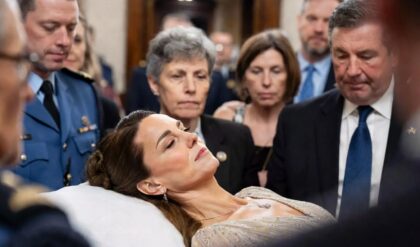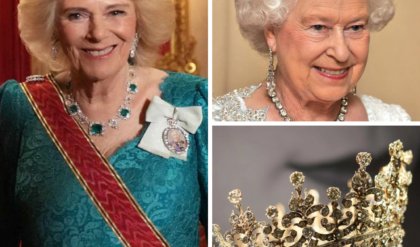Jodie Foster, a cinematic titan with two Academy Awards to her name, has never been one to follow the crowd. Known for her transformative performances in films like The Silence of the Lambs, Taxi Driver, and Contact, Foster has carved out a career defined by bold choices and intellectual depth. In a recent candid reflection on her craft, the 62-year-old actress revealed a guiding principle that has shaped her illustrious journey: a deliberate aversion to biopics. “I’ve never been a big fan of biopics, I just don’t like the form,” Foster stated, her words carrying the weight of an artist who prioritizes creative freedom over convention. Instead, she gravitates toward “making dramatic films about ideas, and being able to shape the character I play.” This philosophy not only illuminates her approach to acting but also underscores her enduring influence as a storyteller who values ideas over imitation.
Foster’s distaste for biopics is not a casual preference but a deeply rooted stance on the nature of storytelling. Biopics, by their very design, are tethered to real-life figures and historical events, often demanding fidelity to facts that can constrain an actor’s ability to explore. For Foster, whose career has been marked by her ability to inhabit complex, multifaceted characters, this constraint feels limiting. “Biopics are about replicating someone else’s life, and I find that less interesting than creating something new,” she has hinted in discussions about her work. Her preference for dramatic roles—those that allow her to mold characters from the ground up—reflects a desire to engage with universal themes and abstract ideas rather than retrace the steps of a known figure.
This perspective is evident in the roles that have defined Foster’s career. In The Silence of the Lambs (1991), she portrayed Clarice Starling, a young FBI trainee navigating a psychological chess game with the brilliant but terrifying Hannibal Lecter. Clarice was not a real person but a fictional construct, allowing Foster to infuse her with a blend of vulnerability, determination, and quiet strength. The role earned her a second Oscar and cemented her as an actress capable of embodying characters who resonate on a deeply human level. Similarly, in Contact (1997), Foster’s portrayal of Dr. Ellie Arroway, a scientist grappling with questions of faith and discovery, showcased her ability to bring abstract concepts—science, belief, and the search for meaning—to life through a character she could shape.
Foster’s aversion to biopics also stems from her belief that the form often prioritizes surface-level mimicry over emotional truth. Many biopics lean heavily on physical transformations or vocal imitations, which can overshadow the deeper work of exploring a character’s inner world. “I’m not interested in just copying someone’s mannerisms or accent,” Foster has implied through her choices. Instead, she seeks roles that allow her to build characters from scratch, drawing on her own emotional and intellectual reserves to create something authentic. This approach aligns with her broader artistic ethos, which values originality and introspection over replication.
Her preference for dramatic films about ideas is not just a rejection of biopics but a celebration of storytelling’s potential to provoke thought. Foster has always been drawn to narratives that challenge audiences to wrestle with big questions. In The Accused (1988), her Oscar-winning performance as Sarah Tobias, a rape survivor seeking justice, tackled issues of victim-blaming and societal complicity head-on. The film’s power lay not in its adherence to a specific person’s story but in its exploration of universal themes—resilience, justice, and the human capacity for empathy. By shaping Sarah, Foster was able to craft a character who felt both deeply personal and broadly relatable, a testament to her skill in bringing ideas to life.
Foster’s commitment to shaping characters also reflects her evolution as an artist. Beginning her career as a child actress in the 1970s, she navigated the treacherous waters of Hollywood with a preternatural talent and a fierce intelligence. Roles in films like Taxi Driver (1976), where she played the troubled Iris at just 12 years old, showcased her ability to inhabit complex characters even at a young age. As she matured, Foster transitioned into roles that allowed her to explore deeper psychological and philosophical terrain. Her work in Nell (1994), where she portrayed a woman raised in isolation with her own unique language, required her to create a character unlike any other—a challenge she embraced with characteristic intensity.
This dedication to crafting original characters has also informed Foster’s work behind the camera. As a director, she has helmed projects like The Beaver (2011) and episodes of acclaimed series such as Black Mirror and Orange Is the New Black. Her directorial efforts often explore unconventional narratives and complex human experiences, further demonstrating her preference for stories that push boundaries. “Directing gives me another way to shape ideas,” Foster has noted, highlighting the continuity between her acting and directing careers. Whether in front of or behind the camera, she remains committed to stories that provoke, challenge, and inspire.
Foster’s recent work continues to reflect her artistic priorities. In True Detective: Night Country (2024), she played Liz Danvers, a tough-as-nails police chief in Alaska’s frozen wilderness. The series, lauded for its atmospheric storytelling and philosophical undertones, allowed Foster to dive into a character driven by internal conflict and moral ambiguity. Liz was not based on a real person but was instead a vessel for exploring themes of grief, isolation, and redemption. The role reaffirmed Foster’s ability to elevate dramatic material, shaping a character who felt both grounded and mythic.
Her reluctance to embrace biopics also speaks to her broader critique of Hollywood’s tendencies. The industry has long been enamored with biopics, which often garner awards attention for their perceived gravitas. Yet Foster, despite her two Oscars, has never been swayed by trends. “I don’t choose roles based on what might win awards,” she has said in various interviews. Her focus remains on the work itself—on finding stories that resonate with her intellectually and emotionally. This integrity has earned her respect not only as an actress but as a cultural figure who prioritizes art over accolades.
Foster’s approach also offers a refreshing counterpoint in an era where biopics dominate the cinematic landscape. Films about historical figures—musicians, politicians, athletes—often follow a predictable formula, tracing a rise-to-fame arc or a moment of triumph over adversity. While these stories can be compelling, they rarely offer the creative latitude that Foster craves. By choosing roles that allow her to explore uncharted territory, she challenges herself and her audiences to think beyond the confines of a single life story.
This philosophy extends to her personal life, where Foster has always guarded her privacy. A mother of two, she has raised her sons, Charles and Kit, largely out of the public eye, emphasizing normalcy over fame. Her commitment to authenticity in her personal life mirrors her approach to her craft, where she seeks roles that feel true rather than performative. “I want to do work that means something to me,” she has said, a sentiment that resonates in every choice she makes.
As Foster looks to the future, her career shows no signs of slowing down. With a filmography that spans five decades, she remains a vital force in an industry that often sidelines women over 50. Her ability to reinvent herself—while staying true to her core principles—sets her apart as a true artist. Whether she’s tackling a gritty drama, directing a thought-provoking series, or mentoring the next generation of filmmakers, Foster’s focus on ideas and character will undoubtedly continue to shape her legacy.
In a world obsessed with retelling real lives, Jodie Foster’s rejection of biopics is a bold statement. It’s a reminder that the most powerful stories are often those we create, not those we recreate. By prioritizing dramatic films that explore ideas and allow her to shape characters, Foster has built a career that is as intellectually rich as it is emotionally resonant. Her words—“I’ve never been a big fan of biopics, I just don’t like the form”—are more than a preference; they are a manifesto for an artist who values imagination over imitation, ideas over idols, and the boundless possibilities of storytelling.





